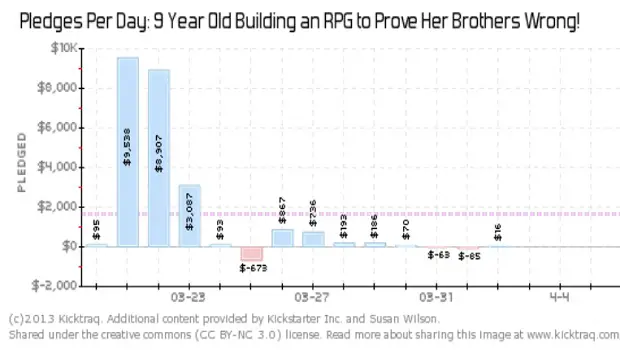 Hello, and welcome to another Kickin’ It! Normally, Kickin’ It would draw your attention to a handful of Kickstarter projects worth your attention, but this week is a little different. Instead of looking at four different Kickstarter campaigns, I’ll focus on one in particular that has caused quite a bit of controversy since it first gained media attention: Susan Wilson’s campaign to raise $829 to send her 9-year old daughter MacKenzie to RPG camp, which has now raised more than $22,000 from backers. This story seems to have divided observers, with some questioning the true motivations behind the campaign and others ardently defending its merits. This week’s Kickin’ It will delve into the various arguments on each side, and try to shed some light on where the truth really lies.
Hello, and welcome to another Kickin’ It! Normally, Kickin’ It would draw your attention to a handful of Kickstarter projects worth your attention, but this week is a little different. Instead of looking at four different Kickstarter campaigns, I’ll focus on one in particular that has caused quite a bit of controversy since it first gained media attention: Susan Wilson’s campaign to raise $829 to send her 9-year old daughter MacKenzie to RPG camp, which has now raised more than $22,000 from backers. This story seems to have divided observers, with some questioning the true motivations behind the campaign and others ardently defending its merits. This week’s Kickin’ It will delve into the various arguments on each side, and try to shed some light on where the truth really lies.
Before we get started, a little background reading might be in order for those who aren’t familiar with the origins of the controversy. This earlier post explains some of the initial questions that popped up as the project gathered steam. Namely:
- Does the CEO of a debt collection agency and one of “the most powerful female entrepreneurs” need help sending her kid to camp?
- Is it against Kickstarter’s terms of service to use the platform for this purpose?
- Is the over $22,000 raised so far justified?
- Is it manipulative to use sibling/gender rivalry to make money?
Up and Coming Campaign – A Wild Kickstarter has appeared!
Despite the questions raised, the prevailing view initially was that this Kickstarter project was simply the story of a mother trying to help her daughter go to camp, and perhaps inspire other young girls to consider careers in technology in the process. It’s a noble goal, and the lack of women in STEM careers is a serious issue. It’s no wonder that the project raised so much money, and defenders argue that its success is no reason to question Susan Wilson’s motives.

A little birdy told me…
Well, let’s assume that Susan Wilson was only looking to raise the $829 cost of MacKenzie’s camp. This immediately raises more questions, one of which is the legality of this goal. Kickstarter expressly forbids “fund my life” projects, such as “pay my tuition” or “help me buy a new camera”. But it’s entirely possible that Kickstarter doesn’t consider camp fees to be tuition or justifies them as part of the RPG making process, so there’s no violation.
That still leaves one violation that’s indisputable, though; Susan Wilson sent dozens of unsolicited tweets to women’s rights groups, celebrities, and others to garner attention for the Kickstarter campaign. Not only does Kickstarter warn that this can lead to campaigns being suspended, but it raises concerns about the motives behind the campaign: why is Wilson so desperate for media attention if she’s only looking for $829? And in a similar vein, where does all of the branded merchandise and a $10,000 reward tier fit in to such a humble goal? It seems that MacKenzie’s mom hoped her campaign would become a viral (and lucrative) phenomenon.
Underrated Details – Money Matters
Is this a fair accusation? I think so. To suggest that Susan Wilson was caught completely off guard by her Kickstarter’s success is to undersell both her business savvy and her previous knowledge of crowdfunding. Susan Wilson was ranked one of CNN Money’s “Ten Most Powerful Female Entrepreneurs” and Fortune’s “Top Ten Female Entrepreneurs”. I’m guessing you don’t get either of those titles by executing ideas with poor planning.
But maybe pure business acumen doesn’t transfer into the rather unorthodox world of crowdsourcing? Well while this may be relatively new territory for many people, it isn’t for Wilson. In addition to owning her own crowdfunding website (we’ll touch on that more in a bit), she also has a record of previous crowdfunding endeavors that certainly don’t lend much confidence. Let’s have a look at a few examples:
July, 2011: “Girls Are Afraid of Money” IndieGoGo project looks to raise $10,000 for AdviseHer.com, an “online personal mentoring platform for girls providing access to real role models”. The campaign ended with only $1,960 raised, but Susan Wilson received those funds in full thanks to the flexible funding nature of IndieGoGo. That should have been enough to make a decent website for a good cause, right? Apparently not. AdviseHer.com is now dead.
May, 2012: “The Cape Project”, Susan’s first Kickstarter, is launched. It sought $20,000 to create a range of custom superhero-style capes crafted by US veterans. Although the reward tiers reflect a wide variety of capes for offer, a photo of a rather interesting *ahem* cape was meant to tempt us to buy in.
August, 2012: “Life-Case” IndieGoGo gives supporters the chance to buy a phone case with space to store credit cards and other essentials for $40. The problem? Although the “Life-Case” is marketed as Wilson’s own invention on IndieGoGo, with reference to her “limited first production run”, it’s clear that she was merely reselling an existing product manufactured by a wholesaler. Each $40 sale would net her $36-39 in profit. Additionally, the case will onlly fit about three credit cards, not the “phone, keys, money, ID, debit card, credit cards, business cards, and more” promised by the “Life-Case” page.

Seems legit.
She has also owned and operated her own crowdsourcing website for female entrepreneurs, FundHer.com, since 2009. Despite being linked to from Susan’s Kickstarter profile when the project started, the website has since been taken down after some questioned whether she was using Kickstarter to get attention for her own website. Her previous attempts at crowdfunding range from failing to deliver on promises to being downright misleading but — at least in the case of the IndieGoGo campaigns– Susan pockets the cash all the same. Her first IndieGoGo campaign disconcertingly states “I’m a liar, a cheat, and a thief”, and her husband previously tried to crowdsource funding for a family vacation. Is it possible that the high reward tiers and aggressive Twitter campaigning are a part of another attempt to turn a quick profit with the power of the crowd?
Updated Motivations – Buy First, Ask Questions Later
The Kickstarter was clearly billed as being to “cover the costs of attending” the RPG camp, with any excess possibly going towards a new laptop for MacKenzie (both potential TOS violations). Once the funding total began to reach into the thousands though, questions were raised about where the rest of the money would go. Susan Wilson, despite making the conscious choice to add higher reward tiers after the project was fully funded, had no clear answer.
The text for the $10,000 reward tier (which offers a “personal apology” from MacKenzie’s brothers) makes mention of helping “start a career” and “fund future programs in computer science”. So was the plan for the excess to go towards MacKenzie’s college fund? As I’ve mentioned, Kickstarter doesn’t allow raising money for tuition. Upon further questioning, Wilson floated the idea that the extra money could be given to charity or used to start scholarships for other kids to attend RPG Camp. Unfortunately, both of these moves are also prohibited by Kickstarter.

Who wouldn’t trust this face?
Susan Wilson’s failure to identify any concrete plans for the more than $21,000 in overfunding the campaign netted raised further concern, including fears that she would simply pocket the cash. People had debated whether she needed the $829 to send Mackenzie to camp (she has since admitted that she didn’t), but she certainly didn’t need over $20,000 to do it. Did she really add a $10K reward tier with absolutely no plans for the funds? And if so, what would have happened to the money if no one asked questions?
After turning to 4Chan and Reddit (seriously) for help, Wilson settled on an explanation: the excess money would go towards hiring professional “artists and developers” to help with the game and creating a website (PinkieSquare.com) to document the process. I don’t know how many artists and developers out there are willing to work on an RPG Maker game with such a short deadline (this July, according to the Kickstarter), and the idea of a hiring a team of professionals kind of ruins the endearing quality of a game made by a highly motivated child, but at least it’s an answer.
So everything has turned out okay then. Whatever wrongs Wilson has or hasn’t committed in the past, this project seems to have a happy ending, right? Maybe not. Although we’ve focused plenty on the financial side of things, not nearly as much attention has been placed on the human side: what about the kids?
Unusual Outcomes – Empowering (One) Woman
Susan’s comments make it a little unclear how exactly the debate between the siblings got started. The Kickstarter page claims that Mackenzie’s brothers told her she couldn’t make a good video game, and Susan helped her daughter start the Kickstarter to prove them wrong. Kotaku got a slightly different version of events; although one brother is going on a trip to Europe and the other to skateboarding camp, they insisted that sending MacKenzie to RPG camp was a waste of money. MacKenzie then came up with the idea to pay for the trip herself, hence the Kickstarter. The differences are mainly semantic, I suppose. Either way, the Kickstarter is supposed to be MacKenzie’s idea.
In addition to the unnaturally forced tone of the Kickstarter’s text, Susan’s explanation for why she added higher reward tiers casts doubt on the actual level of MacKenzie’s involvement. According to Susan, she added the higher tiers were added due to pressure from “very influential” industry folks who crafted the $10K tier almost “word-for-word”. So much for it being MacKenzie’s project.

MacKenzie’s real passion?
In an apparent attempt to quell claims that MacKenzie wasn’t involved in the Kickstarter at all, Susan Wilson recorded and uploaded a video of herself chatting with her daughter about their plans for the game. It revealed MacKenzie’s apparent lack of interest in the Kickstarter, and her mother’s apparent lack of knowledge about video games in general. Much of the video features MacKenzie (who looks much older than in the pictures on the Kickstarter page) discussing various characters from Naruto, which the game will apparently be based on. She seemed genuinely excited about the anime, but her mother’s frequent attempts to relate the discussion back to the RPG or Kickstarter are met with only hesitant agreement. MacKenzie also has to clarify to her mother that Naruto is a show, not an RPG, and neither Naruto nor RPG’s have anything to do with Magic: The Gathering.
This particularly telling exchange occurs near the end of the video:
Susan: Anything you want to say [to the Kickstarter backers]?
Kenzie: I love Naruto.
Susan: How about: we’re gonna build an amazing game, you guys rock, tell me what you want, tell me what you think, we’re going to make this great…?
Kenzie: …No.
MacKenzie’s apparent lack of interest got even some of the campaign’s toughest defenders doubting things. Contributions stalled, and some days even saw net losses in the funding total as some backers withdrew their pledges. Susan subsequently deleted the video, but it has since been reuploaded by another Youtube user.
So we have a mom running a campaign to send her daughter, who doesn’t seem very interested, to RPG camp. How does this raise over $20,000 dollars and why should you care? Although Susan told Kotaku that the campaign “was never meant to be a gender thing”, the Kickstarter page itself suggests differently. A picture of MacKenzie “versus” her brothers is adorned with a call to “support girls in tech”, and STEM is frequently used as a buzzword to describe the camp. The text of the page, along with Susan Wilson’s Twitter spam, focuses on Kenzie’s “mean brothers” (who will apologize for the low, low price of $10,000!). There’s a play on outdated stereotypes: because she likes games, it should be “clear” that MacKenzie is not a “girlie girl”. Everyone knows that girls don’t play games!

Girls should aspire to more…like getting $20K from internet strangers
Trying to connect an $829 camp bill to gender politics is manipulative, as is Susan’s use of pictures of a much younger MacKenzie on the Kickstarter page to tug at your heartstrings (and hopefully your wallet). It also shelters Susan Wilson from media criticism. No one wants to be seen as not supporting girls in tech, or as criticizing a 9 year-old’s dream. Even those who voice legitimate concerns are lumped in with the “trolls” and abhorrent morons issuing threats and personal attacks, or used as proof of just how much resistance there is to getting more female voices involved in technology.
This is ridiculous. The lack of women in science and technology is a serious issue that should be addressed, but is giving one family $20,000 the best way to do it? If video game development is MacKenzie’s dream career path, then we have that in common. I know what it’s like to walk into a programming class and be one of the only girls there, or to get strange looks because I’m female and yes, I like math and play video games. That’s why it makes me so uncomfortable when Susan says the “support girls in tech” message was only “between her [MacKenzie’s] brothers and her” and that the girls vs. boys rivalry is used “in a joking way”. Oh, I get it…not.

Laughing her way to the bank?
Funding has slowed significantly in recent days, but at this point it seems quite likely that Susan Wilson will still have netted more than $20,000 in pledges when all is said and done. Kickstarter considers the campaign within the rules, saying “the goal of this project is to create a video game”. That’s easy to miss, given that the campaign page features several pictures of merchandise but none of any game content. In fact, we know next to nothing about the RPG that is supposedly the reason people are pledging their support. No title, no plot, no features, not even any vague sketches or general ideas of what to expect. Only several days into the campaign (and long after the total surpassed $20,000) were we granted even the most basic information: it’s an “adventure” RPG somehow related to Naruto.
Maybe that’s because the goal of Susan Wilson’s campaign wasn’t to help a little girl make a video game. It wasn’t to start a website with kid-friendly information about game development. It wasn’t even to settle a sibling rivalry. The goal of Susan Wilson’s campaign was to benefit Susan Wilson, to help her finally achieve her long sought after desire of the money and publicity that comes with a successful crowdfunding campaign, even if it means exploiting her children and manipulating the public in the process. She somehow managed to turn the heartwarming story of a little girl with big ambitions into the saddening story of an ambitious mother with little shame.
I wish MacKenzie the best of luck, but she now has more than enough money to attend RPG camp. If you were considering contributing to this Kickstarter, perhaps your money might be better spent by donating to a charitable organization dedicated to helping other girls get involved in STEM.
Breanna has been gaming since infancy, if gnawing on an unattended controller counts as playing a game. One of the younger members of the Gaming Trend family, she dabbled in PC games as a kid but wasn't fully consumed by the hobby until the sixth generation of consoles. Now an avid PC and console gamer, she looks forward to the day when she can scape together enough cash to join the next gen club.
In the last week of middle school, a math teacher taught her how to program a calculator; she was pretty much hooked then and there. Currently working towards a degree in Computer Science and Applied Math, Breanna hope to someday make games instead of just writing about them. Other hobbies include playing guitar, binge-watching Netflix, and cooking delicious food.

See below for our list of partners and affiliates:























